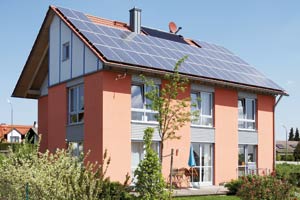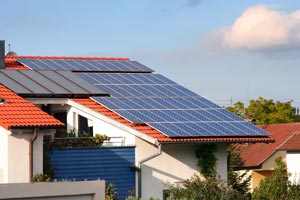Current
informs.
All news at a glance.

We keep you up to date
We bring you the latest developments and news directly to your screen!
Current dates and developments always in view.
Supplemented hobbyist regulations on small solar systems
The German Federal Ministry of Finance has comprehensively supplemented its regulations on hobby farming for small photovoltaic systems and combined heat and power plants and introduced an application deadline.
Anyone who generates electricity with a photovoltaic system or a combined heat and power unit and feeds it at least partially into the public grid is an entrepreneur within the meaning of the Value Added Tax Act and generates commercial income that is subject to income tax. Not only for the owners, but also for the tax office, this regularly means a lot of administrative work for comparatively low sales, because in addition to the annual assessment, the intention to make a profit with the plant must be proven and verified by the tax office.
Due to current developments, the number of photovoltaic systems is likely to continue to increase significantly in the future, despite potentially decreasing profitability due to falling feed-in tariffs. However, in view of the long operating period of such a system and the various influencing factors, it is not always easy to predict whether the system is geared towards generating a profit.
A year ago, the Federal Ministry of Finance therefore created a simplification rule for small photovoltaic systems and combined heat and power plants. According to this, the tax office assumes without further examination that a hobby business not relevant for income tax purposes exists if the operator declares that he wishes to make use of the simplification rule. In this case, the forecast calculation is no longer required and you no longer have to prepare an annual profit calculation.

In practice, it quickly became apparent that the original administrative instruction left many detailed questions unanswered or even raised them in the first place. The Ministry has therefore comprehensively revised its letter and added an application deadline and regulations for certain special cases. In addition to the original hobby regulation, you will therefore also find a summary of these further guidelines from the Ministry here.
Photovoltaic systems with an output of up to 10 kWp and combined heat and power plants with an electrical output of up to 2.5 kW are eligible for the simplification scheme. The total output of the system is decisive here, even if the system is operated jointly by several people or households. A further requirement is that the electricity generated, in addition to being fed into the public electricity grid, is consumed exclusively in rooms used for own residential purposes or rooms provided free of charge for residential purposes. You can also make use of the simplification rule if you have a home office in the property.
Neither profits nor losses from the investment are then taken into account for income tax purposes. This applies both for the future and for the past, insofar as the assessment notices can still be amended, e.g. because they were issued subject to review or provisionally or because they were contested with an appeal. This may result in back payments for previous years if losses from the investment have been taken into account to date. In this case, interest on back payments may also be incurred. In previous years whose assessments can no longer be amended, the previous tax treatment remains in place.
With the simplification rule, the photovoltaic system or combined heat and power plant does not constitute business assets, which means that no profit or loss is subsequently incurred on the discontinuation of the business. Similarly, any hidden reserves that may exist do not have to be determined and ascertained upon the transition to a hobby or when the business is discontinued.
-
Motion: A written declaration to the tax office is sufficient to exercise the right of choice. This can also be sent to the tax office via the ELSTER website or by email. If the conditions for the right of choice cease to apply at a later date - for example because the system has been enlarged - you must inform the tax office of this in writing.
-
Application Deadline: For new installations commissioned after December 31, 2021, the application must be submitted by the end of the year following the year of commissioning. For installations commissioned before 2022, the application can only be submitted until December 31, 2022.
-
Old systems: For systems that were commissioned before 2004 and enter the feed-in tariff under the Renewable Energy Sources Act after the subsidy expires (so-called subsidized systems), the transition to hobby status is possible after 20 years of operation at the earliest. In these cases, the application only applies from the year in which the increased guaranteed feed-in tariff was no longer granted for the first time and must be submitted by the end of the first year with exclusively normal feed-in tariffs at the latest.
-
Several plants: All photovoltaic systems and CHP units operated by one applicant form a single operation, meaning that the individual outputs must be added together to determine the output limit of 10 kWp or 2.5 kW. This applies both to systems located on the same property and to systems located on different properties. It is irrelevant whether the systems are technically separated from each other. Systems that do not meet the other requirements of the simplification rule, e.g. systems whose electricity is made available to a tenant, must also be included. If the limit is exceeded by all systems, the hobby regulation can therefore not be claimed for just one of the systems. A further requirement is that all systems were commissioned either after 2003 or more than 20 years ago. If the first alternative is not fulfilled, the application can only be submitted from the year in which the second alternative is fulfilled. It may therefore be worth decommissioning an old installation early in order to benefit from the scheme earlier for another installation.

-
Power limitation: A photovoltaic system with an installed output of more than 10 kWp, whose maximum power feed-in is limited to 70 % of the installed output due to the regulations of the Renewable Energy Sources Act and therefore does not provide an actual output of more than 10 kWp, does not fulfill the requirements of the hobby regulation even with the output limitation.
-
Consumption: The partial or complete consumption of the electricity generated by the photovoltaic system or the CHP unit by a tenant or for business purposes (except in a home office) - whether for own or third-party use - must be technically impossible. Only separate electricity meters do not fulfill this requirement. This restriction does not apply to rentals if the rental income does not exceed EUR 520 per year.
-
Partnerships: If the photovoltaic system or CHP unit is operated by a co-entrepreneurship (members of a partnership), it is sufficient if the electricity generated is fed into the public electricity grid and is also used privately by at least one co-entrepreneur for their own residential purposes. In the case of co-entrepreneurships, the application must be submitted by the representative or authorized recipient of the partnership if it is not submitted jointly by all co-entrepreneurs.
-
Investment deduction: Anyone who has used an investment deduction for the solar system or CHP need not worry about the hobby rule. The Ministry expressly states that the use of the regulation is not a harmful use of the investment that would lead to a subsequent refusal of the deduction amount and the special depreciation.
Incidentally, the hobby option has no effect on VAT, because in VAT law, the only thing that matters for entrepreneurial status is whether the operation of the system is intended to generate income. Whether the system is operated at a profit or loss for tax purposes is irrelevant. However, there is a small business regulation in VAT law, under which the operators of a photovoltaic system or a combined heat and power plant regularly fall.
With the small business regulation, no sales tax is levied on the revenues and you then usually do not have to submit any advance sales tax returns. However, in this case you cannot claim any input tax. In combination with the hobbyist option, however, the regulation has the advantage that there are then no ongoing tax obligations associated with the investment.
Those who instead wish to claim input tax from the purchase of the system must waive the small business regulation. This option then binds the operator for at least five calendar years. After that, a return to the small business regulation is possible.